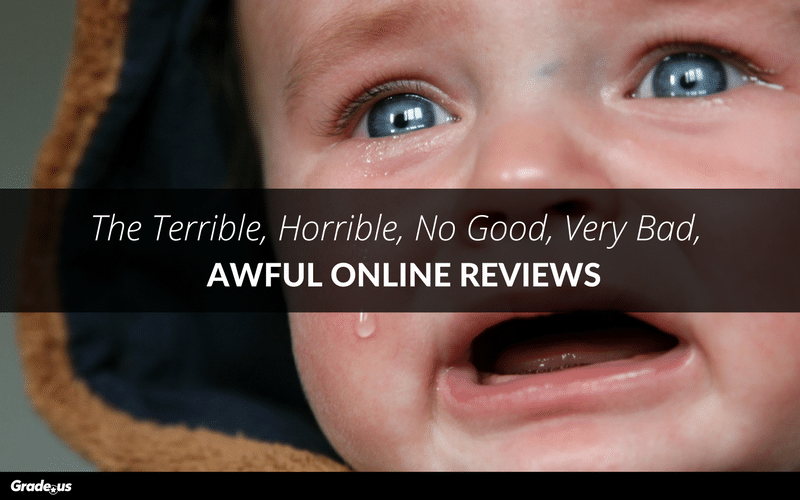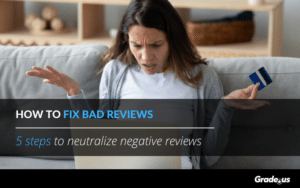John Verrier is dying.
He went to the St. Barnabas hospital’s ER to get his rash checked out. He was in an incredible amount of pain and he was fading… fast. But hospital staff ignored him.
He waited 8 hours for help.
Then he died.
At 6:40 the next morning a security guard found John’s dead body slumped over in his chair. A staff member said he was cold, blue and stiff stating he was dead for several hours.
St. Barnabas’ excuse? They were understaffed.
Their excuse made the situation so much worse
The hospital created this disaster then, when it came, they did everything they could to cover it up. They lied about it. They hid behind HIPAA, they warned employees to be quiet.
Naturally this created an incredible amount of anger and negative sentiment.
The public was understandably upset. They wanted to be heard, they wanted the hospital to make things right – to own up to their mistakes. But their horrible service created the negative reviews and backlash they received.
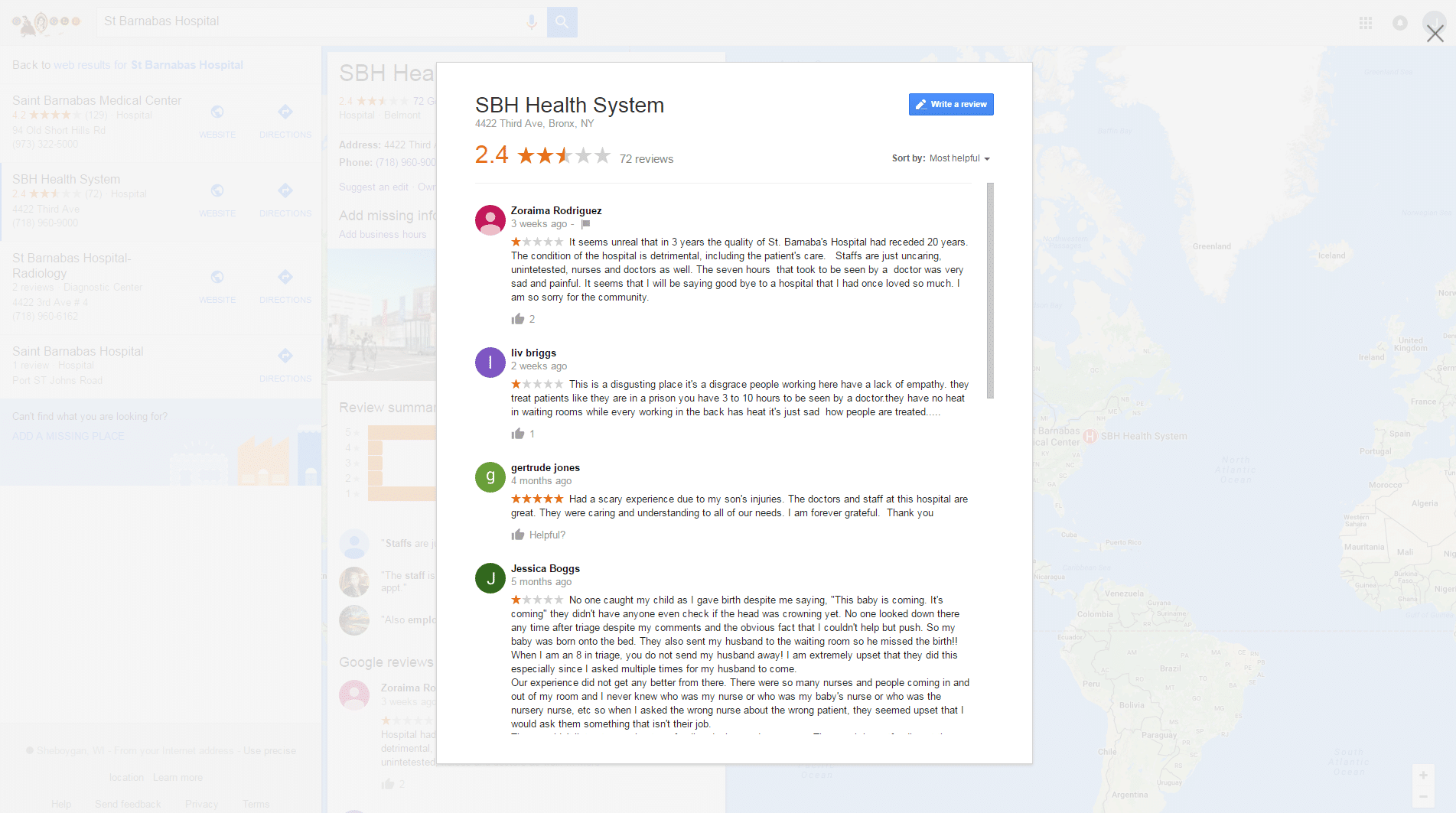
Bad service = negative reviews.
That’s common sense right? John Verrier’s story is as extreme as it gets which is why there was such an awful backlash when his story came out. But a bad review itself isn’t truly awful. Bad reviews turn customers away temporarily. Late delivery, things weren’t as expected, can’t get the help you need, etc. Kind of like this:
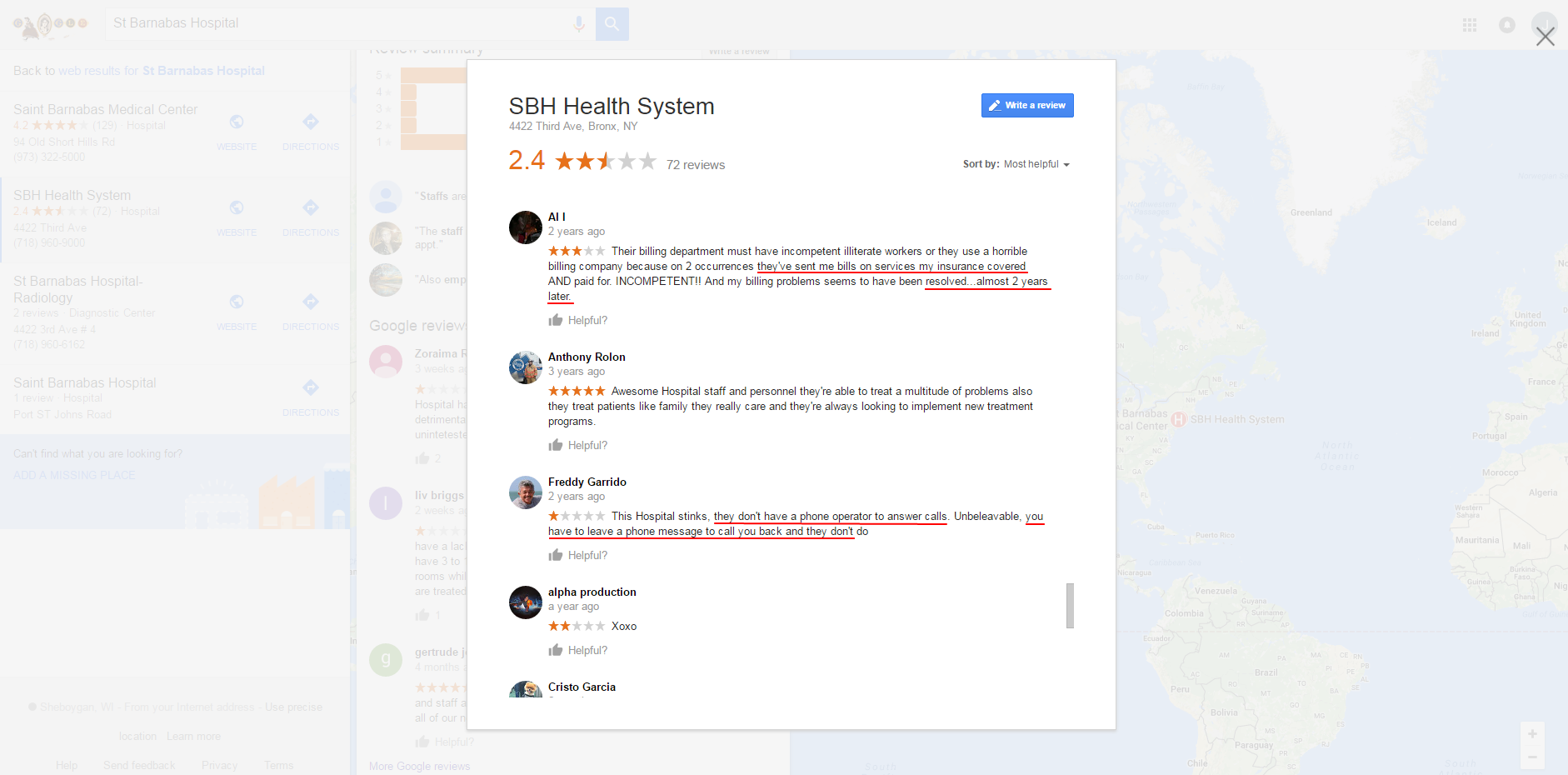
Fix these issues and eventually, customers come back.
Not the case with a truly awful review.
The ‘truly awful’ review is permanent
And so are the damaging effects. But why? What makes the “truly awful” review so much worse than a negative review? What does it matter if it’s bad or awful, aren’t they both the same?
Not so much.
A truly awful review is far more damaging because it’s foundational. It exposes the company’s character, attitude, values and beliefs. Take this review for example:
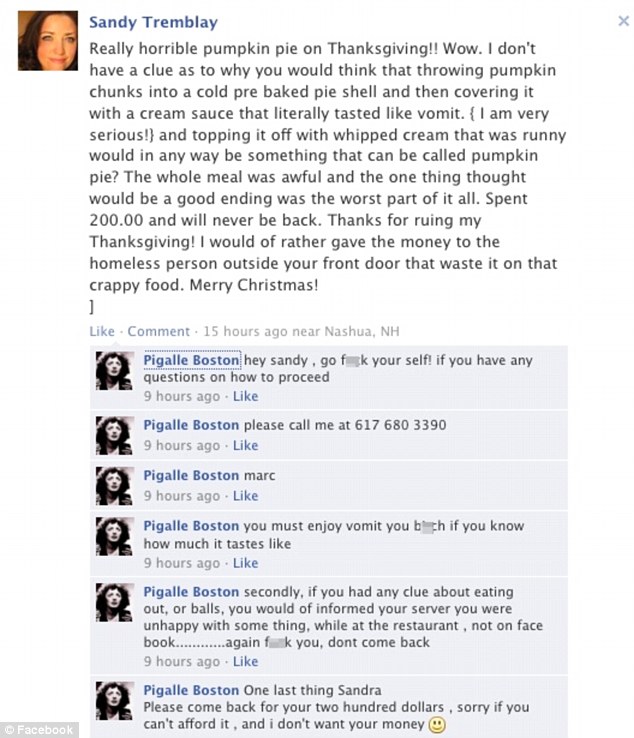
Sandy had a horrible Thanksgiving dinner. She spent $200 dollars on a meal for her family and things went badly. She’s direct and pretty blunt, which I imagine stings a bit.
At this point, the restaurant has a choice to make.
Do they confirm to prospective customers that this restaurant is pretty awful? Or do they try to make things right?
They make things worse.
Marc, the chef at Pigalle Boston, decides to curse(!) at his unhappy customer calling her all kinds of nasty names. He tells her to come back for her money, he attacks her character.
His attack confirms her accusations, and EVERYONE can see it on this public channel.
Marc lost his temper showing the whole world his character, attitude, values and beliefs. His behavior tells everyone that Sandy was right about his restaurant.
And attacking customers isn’t the only way to earn truly awful reviews.
Regardless of industry, these days, you just need to make one particular mistake, and you’re asking for trouble. When you ignore this foundational principle, you’re on your way to earning truly awful reviews.
What mistake am I talking about?
Poor presentation
When we hear the word ‘presentation’ most of us think of PowerPoint slides, a speech or graphic design. But presentation is much, much more than that.
Presentation is a vehicle. It’s a mixture of tangible and intangible factors working together.
- Tangible. The quality of your product, how you look, visuals – the taste, texture and smells associated with your product. Tangible typically includes sensory details, things you can touch, taste, see, smell, interact with, etc.
- Intangible. The beliefs, behavior, culture, values and temperament of your business. These are the important details customers can’t see but desperately want to know about.
Here’s an important detail that most people miss.
Customers use the tangible (things they can see, smell, taste, touch, hear) to tell them about the intangible, things they can’t use their senses to experience.
Here’s what that looks like.
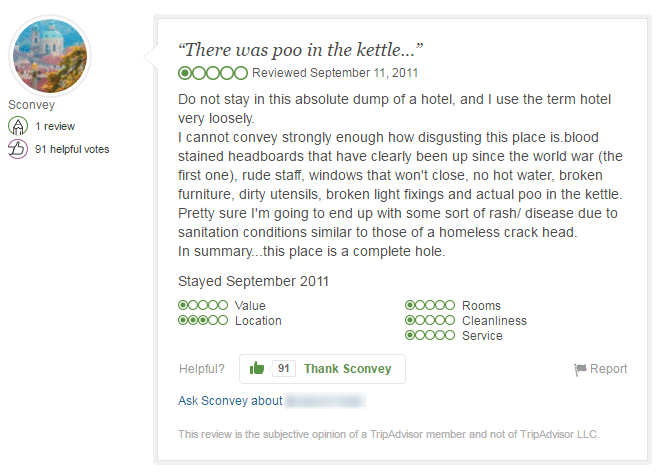
This is a truly awful review. It’s pretty obvious right?
Here’s why this is so awful
This review reveals an intangible problem. Deep defects of character that indicate this hotel is untrustworthy and unsafe. The tangible speaks volumes about the intangible which is much harder to fix.
Let’s break it down.
Tangible: blood stained headboards
Intangible: questionable things happen here.
Tangible: no hot water
Intangible: owners aren’t interested in providing basic amenities but still want my money.
Tangible: Poo in the kettle
Intangible: Their hotel is dirty, full of disease, and definitely unsafe.
Customers make all kinds of intangible conclusions based on the tangible details they see. The tangible/intangible impacts industries that aren’t typically judged on tangible components. A doctor may offer incredible service and still get bad reviews because his waiting room is filthy. Customers judge based on the tangible details they notice at any point during your relationship.
And that’s the problem.
These intangible details can be fixed, if you have lots of time and people are willing to give you the benefit of the doubt. But most customers won’t.
Because the intangibles tell customers who you really are
They answer deep, weighty questions like…
- Can I trust you?
- Why should I choose you?
- Will you hurt me?
- What if you get it wrong?
Give customers the wrong answers to their tangible and intangible questions and they simply move on, no harm no foul.
Share the right answers to their questions and they convert. They sign-up, buy, opt-in, etc. They take the action you’d like them to take.
The problem? Winning customers over creates danger.
Because customers believe you’re a fit. Because they believe the intangible details – character, beliefs, values, temperament, etc. – are compatible with their own.
As a business, you’re left with two options:
Be superior. This means you go above and beyond their expectations. You go out of your way to give them an experience that’s much better than they anticipated.
Be inferior. You go out of your way to give them less than they anticipated. You consistently over-promise and under deliver. What about adequate? Adequate is still inferior.
Both options create a desire to share the details with customers; superior outcomes create happiness and joy while inferior outcomes create pain and anger. And as research shows, anger is a far better motivator than happiness.
‘Truly awful’ reviews come from…
… Humiliation and Betrayal. Some businesses like Blackpool hotel use humiliation and betrayal as weapons to coerce customers into leaving positive reviews.
That’s incredibly gross behavior.
That’s not what I’m talking about.
When customers build a relationship with a company, things change. It’s no longer your business but, our business.
When Coca-Cola changed their secret formula in 1983 customers were enraged. Customers bombarded them with more than 400,000 angry calls and letters. Coca-Cola realized it wasn’t their business anymore it was our business.
Customers expect fidelity, consistency and stability. They want to know that you’re taking care of them. That you’re behaving in a way that’s consistent with our values.
When you fail to be superior, to treat things as our business, customers feel humiliated and betrayed. They feel foolish for falling for your shtick, which motivates them to give you an awful piece of their mind. It sounds ridiculous at first glance.
Angry? Maybe. Humiliated? Never.
Imagine that you’ve invested your money in a hedge fund. You’ve tripled your returns year-over-year. You’ve told your friends, family, co-workers about this company.
They’ve all made tons of money.
How do you feel?
Now imagine that the hedge fund is run by none other than Bernie Madoff.
Now how do you feel?
How are you likely to respond to all this?
See what I mean?
So how do you avoid these mistakes?
Be superior to avoid ‘Truly awful’ reviews
Customers desperately want you to be superior. Many of them have this fantasy, this deep desire to work with a company that takes care of them.
But what does that look like?
Danny Meyer knows. His Union Square Hospitality Group is the company behind Union Square Cafe, Gramercy Tavern, Shake Shack and others. He’s fostered a culture of customer service at each one of his restaurants.
Each and every one of his restaurants have been listed in the top 40 of Zagat’s ratings of customer service, since they’ve opened.
How does he do it?
He gets employees to create what he calls “extraordinary experiences” for each customer.
For example, a woman enters Gramercy Tavern, one of Danny’s restaurants, and she’s upset. She left her purse in the taxi that dropped her off for lunch.
She’s lost her purse, she has no way to pay for her meal, and no way to get back to work.
She’s panicked.
The culture of hospitality Danny has cultivated kicks in. An employee, “Carlo” seats her with the rest of her party and feeds her for free.
It gets better.
Carlo gets a co-worker to repeatedly call her cell phone number. Thirty minutes later the taxi driver hears and finally answers the phone.
Carlo arranges to meet the taxi half-way, goes there himself to retrieve her purse, pays the driver for his trouble and heads back to the restaurant…
Where he presents the purse to his unhappy customer just as she finishes her lunch!
Carlo’s customer service is… Legendary.
But it’s also routine.
Danny Meyer influences his 1,500 employees to create these extraordinary experiences for their 100,000 customers every single day.
See what I mean?
Being superior is a complete strategy. It’s the antidote to truly awful reviews.
Some customers will write nasty reviews anyway
It’s true. If you’re superior you’re still going to get the occasional toxic customer. You’re still going to have detractors. But you’re superior, that means you’re going to get superior reviews. In time you’ll have an audience full of people eager and willing to share their story.
Nasty reviews, can’t survive in this environment.
Very quickly, prospective customers see the truth. Story after story outlining the wonderful things you’ve done. The specific details and events that outline why you’re different.
Prospective customers will see through these anomalies. They’ll compare them against the reviews they already have; they’ll see these reviews for what they are.
Misplaced hostility.
Do everything right and you’ll still get bad reviews.
You’ll miss the boat from time to time. But your customer’s experience is key. Show customers you’re superior, even when you stumble and fall. Use the tangible and intangible presentation factors to answer their questions and avoid nasty reviews.
The ‘truly awful’ review is temporary if…
… You’re superior. St. Barnabas hospital displayed inferior behavior. Patients watched as John Verrier died alone and in pain. What they saw spoke volumes about what they couldn’t see.
You’re different.
You know the secret to earning awful reviews. You’re aware of the pitfalls and traps waiting for you. But now, you know how to avoid them. Your secret? You’re superior.
You go above and beyond, giving customers more than they asked for. Extraordinary experiences are the norm for them. You under promise and over deliver, giving customers the incentive they need to create…
Truly amazing reviews.
About the Author
Andrew McDermott
Andrew McDermott is the co-founder of HooktoWin. He shows entrepreneurs how to attract and win new customers.

